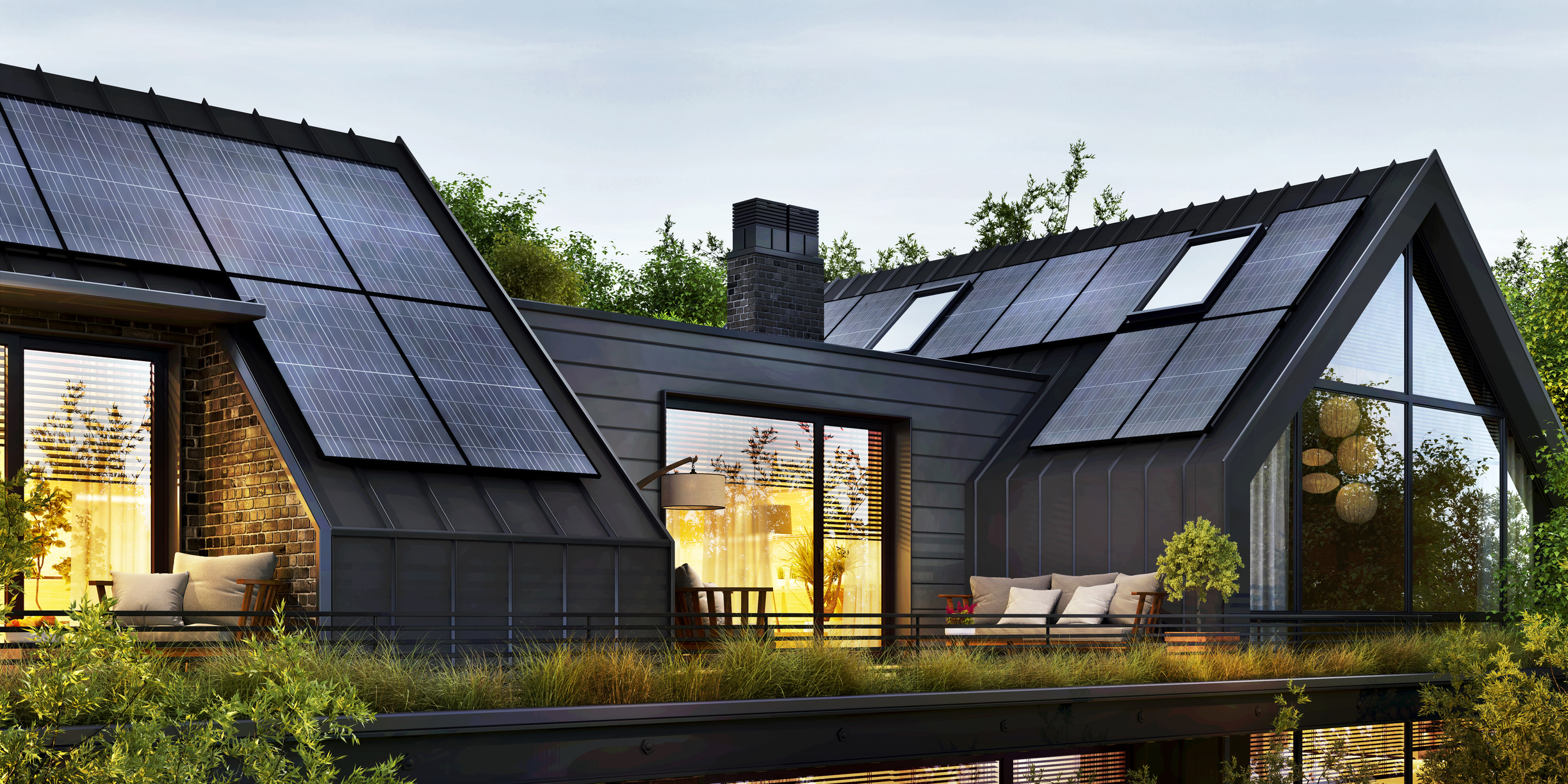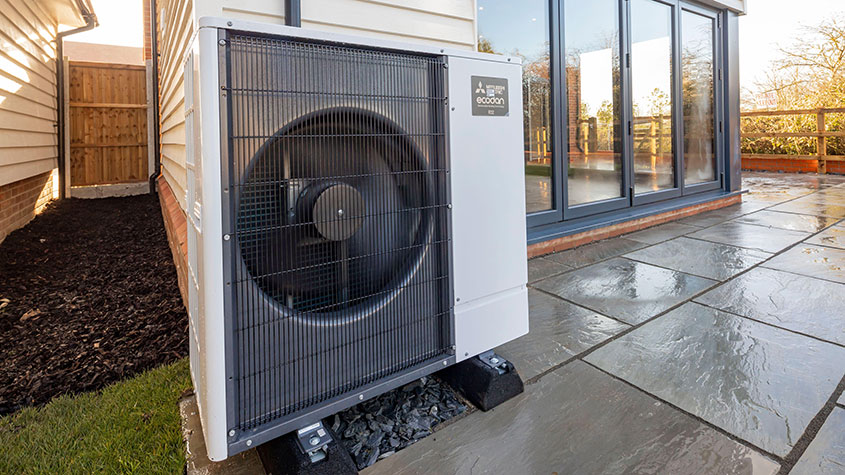Solar panels vs heat pumps – which is most cost-effective?
If you’re looking to cut carbon emissions at home and save on your energy bills, you may want to consider investing in solar panels or a heat pump – but which is most cost-effective?

Oojal Dhanjal

Get the latest financial news, insights and expert analysis from our award-winning MoneyWeek team, to help you understand what really matters when it comes to your finances.
You are now subscribed
Your newsletter sign-up was successful
Want to add more newsletters?

Twice daily
MoneyWeek
Get the latest financial news, insights and expert analysis from our award-winning MoneyWeek team, to help you understand what really matters when it comes to your finances.

Four times a week
Look After My Bills
Sign up to our free money-saving newsletter, filled with the latest news and expert advice to help you find the best tips and deals for managing your bills. Start saving today!
Solar panels vs heat pumps? Both types of renewable energy systems can reduce your carbon footprint, improve your home’s energy efficiency and save you money on your energy bills.
If you're looking to reduce your energy bills, we've analysed traditional ways of heating your home – fan heaters vs oil heaters, for example and the cost difference between electric heaters and radiators. But if you're also looking at ways to improve your home's energy efficiency, you may be considering solar panels and/or heat pumps.
Which one will reduce your costs the most? We put them head to head to find out.
MoneyWeek
Subscribe to MoneyWeek today and get your first six magazine issues absolutely FREE

Sign up to Money Morning
Don't miss the latest investment and personal finances news, market analysis, plus money-saving tips with our free twice-daily newsletter
Don't miss the latest investment and personal finances news, market analysis, plus money-saving tips with our free twice-daily newsletter
How heat pumps work
Heat pumps use electricity to extract heat from the air and pump it into your home. This thermal energy can be used to heat your water supply and keep your home warm. Heat pumps manage to produce so much thermal energy that they can dramatically reduce your dependence on your energy provider and therefore save you money on your energy bills.
Although the ban on gas boiler installations has recently been extended (from 2025 to 2035), if you're looking to replace an old boiler you may want to consider installing a heat pump.
How solar panels work
Put simply, solar panels generate electricity which can be used to help power electrical systems in your home.
Solar panels have never been such a popular option: more solar panel installations have taken place this year than in the whole of 2022, according to trade body Solar Energy UK. More than 1.3 million households in the UK have solar panels, The Eco Experts estimate.
The pros of heat pumps
- Heat pumps are much more efficient than gas boilers and produce three or four times the energy they use.
- Heat pumps are durable, require minimal maintenance and last 20 years or more before they need replacing.
- The government’s Boiler Upgrade Scheme is offering £7,500 grants towards heat pump installation. This funding has been extended by three years to 2028 – giving you more time to take advantage of the opportunity.
- Energy firms Octopus Energy and Eon supply and install heat pumps: this is a good option if you struggle to find a local installer (see ‘cons of heat pumps’) or need reassurance from a familiar firm for the new technology. Note that Octopus is working towards making it cheaper overall in the near future.
- Heat pumps emit no carbon dioxide, nitrogen dioxide or particulates. This can help to improve the air quality inside and outside the home.

The cons of heat pumps
- An air source heat pump costs around £14,000 according to the Energy Saving Trust. With the government’s £7,500 grant, it will still cost a significant amount.
- Necessary additional upgrades will add thousands of pounds to the overall cost. As the UK has some of the least energy-efficient housing in Europe, it’s likely your home will need better insulation, double glazing and/or different radiators.
- Heat pumps use electricity and are therefore pricey to run. Electricity is almost four times more expensive than gas per unit so energy bills can actually increase after installing a heat pump.
- Heat pumps only produce heat and cannot generate electricity, so can only provide energy for certain systems within your home.
- It’s difficult to find an installer and they are often booked for months. The heat pump industry is still small in the UK.
- Heat pumps do not warm a home as quickly as a gas boiler. Naturally cold homes will heat up much more slowly.
- Heat pumps can be tricky to install in homes with combi boilers, which will need to find space for a hot water cylinder.
- Some homes do not have outside space for a pump.
- Heat pumps can be noisy due to their fans.
The pros of solar panels
- Solar panels could reduce your annual energy bill by 70% or £520 a year on average, according to The Eco Experts.
- With the current 0% VAT rate on solar installations, you will be left with at least ten years of profit. A three-bedroom household will end up with a total profit of about £5,151 in savings and Smart Export Guarantee (SEG) revenues (see below).
- You can sell electricity back to the National Grid or an energy supplier through the SEG. On average you can sell it to the National Grid and get £159 a year in SEG payments. As of now, the rates can range anywhere from 1p to 16p per kWh (Octopus Agile Outgoing can pay more, but its rates fluctuate every half an hour).
- You can buy solar panels through your local council and group-buying schemes such as Solar Together. This aims to provide more competitive pricing.
- Solar power allows you to generate most of your electricity for lights and appliances.
- It can even power an electric car. According to Octopus, the average domestic solar PV system can generate one to four kWh, which is enough to charge an electric car that has a battery capacity of 40kWh in about eight hours.
- Solar power systems are easy to fit, even in old homes.
The cons of solar panels
- The average solar panel system for a three-bedroom house costs £7,860, according to The Eco Experts. You can compare solar panel costs with their solar panel cost calculator to work out your home’s likely installation costs and potential annual energy bill savings.
- It can take anywhere between 16 and 21 years for solar panels to break even for an average household. This depends on your electricity usage and what you’re paid under the SEG.
- A battery costs £4,500, according to The Eco Experts. You’ll need one to use your solar energy at night and would be self-sufficient in the event of a power cut. Batteries can last about 15 years.
- Solar power doesn’t quite cut it when it comes to heating. Put simply, you need an extra source of hot water to help.
- Not all homes are suitable for solar panels. You need a fair amount of space, your room must be in good condition and, depending on your property, you may or may not require approval from your local authority.
Costs and savings examples
We’ve looked at the costs and benefits involved for a three-bedroom house –considering the installation of solar panels or a heat pump.
Heat pump costs and savings: If the homeowner opts for a heat pump they can expect to spend £5,000 with the Boiler Upgrade Scheme (and probably several thousands of pounds extra on better insulation and/or different radiators) and make a £217 average annual saving on their gas bill – or £4,340 over 20 years.
Solar panels costs and savings: If the homeowner opts for solar panels they can expect to spend £7,860 (plus another £4,500 if they buy a battery) and make a £520 average annual saving on electricity bills, plus sell excess energy to the grid for £159, making a total annual saving of £679 – or £13,580 over 20 years.
Solar panels vs heat pumps? The verdict
Both renewable energy systems have similar installation costs but solar wins big, with savings of around £462 annually – or £9,240 over 20 years
Josh Jackman, energy expert at Eco Experts, says: “Heat pumps will definitely eventually come down in price, but solar will still be the better choice for a long time.”
Get the latest financial news, insights and expert analysis from our award-winning MoneyWeek team, to help you understand what really matters when it comes to your finances.
Katie is deputy editor of Times Money Mentor and long-time contributor to the Sunday Times where she started on the Irish desk in 2012 and spent 10 years covering news, culture, travel, personal finance and celebrity interviews.
Her investigative work on financial abuse has examined the response of banks, the Financial Ombudsman and the child maintenance service to victims, and resulted in a number of debt and mortgage prisoners being set free - and a nomination for Best Finance Story of the Year at the Headline Money awards in 2021 and 2022.
Katie was also shortlisted for Freelance Journalist of the Year at the Headline Money awards in 2022, 2023 and 2024 and won Personal Finance Journalist of the Year at The British Bank Awards 2022.
- Oojal DhanjalEditorial Content Producer
-
 Should you buy an active ETF?
Should you buy an active ETF?ETFs are often mischaracterised as passive products, but they can be a convenient way to add active management to your portfolio
-
 Power up your pension before 5 April – easy ways to save before the tax year end
Power up your pension before 5 April – easy ways to save before the tax year endWith the end of the tax year looming, pension savers currently have a window to review and maximise what’s going into their retirement funds – we look at how
-
 Act now to bag NatWest-owned Ulster Bank's 5.2% easy access savings account
Act now to bag NatWest-owned Ulster Bank's 5.2% easy access savings accountUlster Bank is offering savers the chance to earn 5.2% on their cash savings, but you need to act fast as easy access rates are falling. We have all the details
-
 Moneybox raises market-leading cash ISA to 5%
Moneybox raises market-leading cash ISA to 5%Savings and investing app MoneyBox has boosted the rate on its cash ISA again, hiking it from 4.75% to 5% making it one of top rates. We have all the details.
-
 October NS&I Premium Bonds winners - check now to see what you won
October NS&I Premium Bonds winners - check now to see what you wonNS&I Premium Bonds holders can check now to see if they have won a prize this month. We explain how to check your premium bonds
-
 The best packaged bank accounts
The best packaged bank accountsAdvice Packaged bank accounts can offer great value with useful additional perks – but get it wrong and you could be out of pocket
-
 Bank of Baroda closes doors to UK retail banking
Bank of Baroda closes doors to UK retail bankingAfter almost 70 years of operating in the UK, one of India’s largest bank is shutting up shop in the UK retail banking market. We explain everything you need to know if you have savings or a current account with Bank of Baroda
-
 How to earn cashback on spending
How to earn cashback on spendingFrom credit cards and current accounts to cashback websites, there are plenty of ways to earn cashback on the money you spend
-
 John Lewis mulls buy now, pay later scheme
John Lewis mulls buy now, pay later schemeThe CEO of John Lewis has said the retailer will consider introducing buy now, pay later initiatives for lower-priced items.
-
 State pension triple lock at risk as cost balloons
State pension triple lock at risk as cost balloonsThe cost of the state pension triple lock could be far higher than expected due to record wage growth. Will the government keep the policy in place in 2024?
